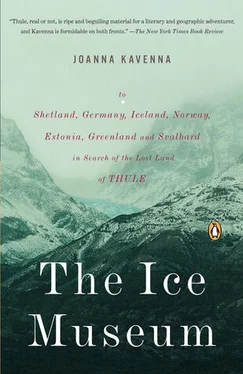‘You asked me about Thule; I have even written a poem about it. I wrote one about Thule, because it is the most ancient reference to our nation, it shows that people knew about our country even before Christ. My poem is about the idea of a perfect land, and how that might be, and how Iceland has never really been a perfect land, because of the violence of the rocks, and because of the difficult history of the people. It’s been a hard time, for the people. They lived well, though the Vikings were rough and vicious, until they were taken over by Denmark, and then after that the country slid into a decline for centuries, until the nineteenth century, when our poet Hallgrímsson took up literary arms for Iceland, and tried to stir his countrypeople up. He just wanted them to care, he was an amazing man. Jonas Hallgrímsson. I’ll find you a poem by him too.’
That was how Johannes talked, a thick stream of words, with no real sign of stopping. It was perhaps the coffee; it was perhaps the overflowing bar, with the Icelanders draped scenically around; it was perhaps the length of the days, the awareness that the daylight would continue through the night that made Johannes so verbally energetic. Johannes opened his notebook, coughed into his ink-stained hand, and said, ‘This is my poem about Thule:
A LAND THEY WEREN’T QUITE SURE ABOUT
UNCERTAIN AND DERANGED
LOST FLAMES OF FIRE COATING THE ABANDONED ROCK
AN UNKNOWN LAND, UNTIL THEY CAME.
A GREEK IN A WARSHIP WAS THE FIRST,
HE ADMIRED THE ICE AND THE SUN AND TURNED AROUND
THIS LAND WAS TOO MUCH FOR HIM.
THE VIKINGS DRAGGED THEIR BOATS ACROSS THE SEA
THEY WANTED ANOTHER LAND
FREEDOM THEY CRIED WHEN THEY SAW THE ROCKS
FREEDOM FREEDOM FREEDOM
FREEDOM.
‘That’s just the first verse; there are another fifty-two. One verse is just the word freedom, repeated thirty-four times. I like the word “freedom,” ’ he said. ‘If you come to the café in November I am doing a poetry week. My subject is Liberty through Poetry. Sometimes, when I feel like it, I will organize a poetry evening, with a free salmon supper for anyone who can recite one of my poems from heart. This is no mean feat; I never write anything less than thirty stanzas long. I believe in the oral tradition. The Viking poems were originally recited—like your tradition, your Anglo-Saxon poems, with the scop—the poet. The scop was such a great thing to be, a poet sitting by the fire, with a beer, and then suddenly they’d call on him to make up a verse about anything—usually the same old things, of course—a battle or a dead warrior—and the scop would launch into something—I think that’s a wonderful thing to do. At my recitals we try impro-poetry—where the audience decides the theme, and I jam with it, and I set a limit of forty-two stanzas to my improvisation. I like to improvise in iambic pentametres, but it’s hard, you can imagine.’ He laughed.
‘You should try our beer, Thule beer, it’s very good, brewed in the north, in our second city Akureyri,’ said Johannes, handing me a bottle. ‘I never write without having drunk half a crate of the stuff.’
There was something gently preposterous about Johannes. There was something gently preposterous about our encounter, as he sucked at his ink-stained fingers and spilt his beer on the table. His hands were shaking; I wasn’t sure if it was nerves or an excess of frenetic energy. He was staring earnestly at his bottle of beer. ‘Could you recite me a poem?’ I asked.
He sucked pensively for a while on his beer bottle before saying: ‘No, it’s the summer. There’s no time in the summer. It’s in the winter I get really verbose. In the summer, haiku, maybe a sonnet. Only in the winter can we do epics. There’s not much to do in the winter in Iceland. Perhaps people are glad of a chance to sit still for a while. We have a writer,’ he added, ‘called Halldór Laxness, who won the Nobel Prize for Literature, we are very proud of him. He was no poet, of course, our only poets are Hallgrímsson and me on my best days, but Laxness wrote all about the countryside, and he said that it’s all very well thinking the countryside is full of the past, full of the memories of former Icelanders, and seeing the landscape as a great symbol of Iceland, but there are days when all we notice is the sun, the sun shining on the hills. On these days, the sun is stronger than the past. You can’t always be banging on the drum, you know, some days you just sit and enjoy the warmth on your toes.’
Laxness loved the damp bogs where the farmers tended their sheep, the winds sweeping along the treeless hills, the sound of rain on stone. No Icelandic writer better evoked the vastness of the valleys, the broad winter skies, stained a deep blue, the simple lives of the people. His characters were disturbed, at times, by the strangeness of the land around them; in Independent People a farmstead seems to be haunted by an ill-favoured spirit, and the farmer finds his life slowly destroyed. They sometimes longed for escape, though when they stood on a quayside watching the ships being loaded, holding tickets to the USA, they found they couldn’t leave; they turned their horses around, and galloped back to their cold valleys.
Later, Johannes rubbed my hand with his ink-stained palm, told me to read his poems, and then disappeared onto the street.
I left Reykjavík, under a cloud of rain. I drove out towards Thingvellir, the centre of the weird Icelandic Thule, once home to the Viking Parliament, the Thing. The road wound past scree mountains oppressed by mist, the valley floors scattered with shrubs and slender birch trees, the soil a vivid shade of orange. In a sudden sunny interval, the geothermal town of Hveragerði steamed under the scree. Small bakeries were selling dry cakes and salmon rolls, but the restaurants were shut, their blinds pulled down. The skies darkened and clouds hovered above the small town. The road ran across a plateau, as rain began falling in thick streams onto the dank grass. Across the farmland and the mud ridges I saw clouds of smoke rising slowly from Geysir ahead, mingling with the rain and the mist.
Geysir was a village engulfed in a geothermal haze. Through the mist the barrack-shapes of two hotels and the white concrete walls of a petrol station were dimly visible. At the field of the geysirs a few tourists stood in the rain, waiting for one of the boiling pools to erupt and blast a column of water out of the sand. Smoke was rising from the ground, drifting with the wind. The ground was multi-tone: red sulphur sand streaked with blue, brown and yellow, soft grey-white silica; coral-like rocks; rusty moulds, coated with water from the explosions and lashed by the driving rain. I stood over the steaming pools, watching the water bubble. The rain drowned out the soft gurgles and splutters from the steam pools. There was a rock kettle, with steam bursting out of a funnel, and a brilliant blue basin, with a puddle of water bubbling inside it.
At the Geysir Hotel they were serving up salmon in the restaurant, and when the rain started to fall harder everyone retreated there to watch the drifting clouds from a distance. The napkins were folded into towers on the tables. ‘Like the geysir spout,’ said the waitress, smiling, as I sat down. The food arrived, and no one much noticed it. Everyone was fixed on the view through the window, sitting at an angle to the tables.
We all waited patiently, and as we speared salmon onto our forks the smaller geysir rumbled up to an explosion, spraying the plain.
In the early nineteenth century they had lined up in tents on the geysir field, bedding down not far from the Great Geysir: ‘We pitched our tent at a distance of about one hundred yards from the Geysir, and having arranged matters so that a regular watch might be kept during the night, I went to my station at 11 o’clock, and my companions lay down to sleep,’ wrote Sir George Steuart Mackenzie. William Jackson Hooker, Fellow of the Wernerian Society of Edinburgh, had arrived in 1809, and was disturbed during the night by an explosion, followed by ‘a most brilliant assemblage of all the colours of the rainbow, caused by the decomposition of the solar rays passing through the shower of drops that was falling between us and the crater.’ Persistent, these travellers would stay for several days, camped by the geysirs, awaiting the subterranean rumbling, counting the minutes of the explosions, and noting them down in their immaculate pocketbooks. The geysirs, they wrote, danger of approaching them, rules to be observed, suspense while waiting, transparency and clearness of the waters, beautiful diversity of colours, eruption of the geysirs. They wrote poems, paeans to the red nostrils of the Great Geysir, imagining it like a dragon, its waters like fiery breath, a boiling deluge poured across the blasted heath.
Читать дальше












